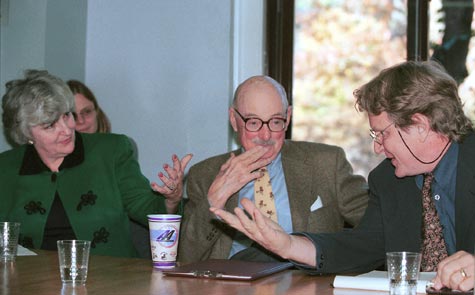Panel: Tibet victim of China’s ‘siege mentality’

Ignoring Tibet won’t make it go away. That is the message the People’s Republic of China needs to hear, according to authorities on the Tibet situation who spoke Nov. 2 at a panel discussion at the Fairbank Center for East Asian Research.
China currently ignores calls from Tibetan activists, from human rights watchers and from national governments to address human rights violations in Tibet, preserve Tibetan culture, and negotiate a return of Tibetan spiritual leader, the Dalai Lama.
Instead, China appears to be hoping that questions about China’s governance of Tibet will disappear if they are stalled long enough – until the Dalai Lama dies.
The Chinese government is mistaken, according to the Fairbanks Center panelists, because international support for Tibet is born out of opposition to Chinese actions in Tibet and out of a desire to preserve Tibet’s cultural uniqueness, not because of personal support for the Dalai Lama.
“They’re in denial that there’s a problem,” said Robert Thurman, president of the Tibet House, a New York organization dedicated to preserving Tibetan culture. “The point is it’s not just the Dalai Lama. The reason that people like the Dalai Lama is he is a product of Tibetan civilization. … The world has recognized on a popular level that there’s something precious about this civilization.”
Thurman spoke as part of a three-member panel that also included Julia Taft, the U.S. State Department’s special coordinator for Tibetan issues and assistant secretary of state for population, refugees and migration affairs, and Harvard teaching fellow Tashi Rabgey, a native Tibetan.
The three discussed U.S. and Chinese attitudes toward Tibet during a two-hour program called “The Chinese-Tibetan Stalemate.”
Tibet has been a part of China since Chinese troops invaded in 1950 and a treaty made it official in 1951. The Dalai Lama fled in 1959 when Chinese troops put down a Tibetan uprising.
Taft explained that the U.S. government recognizes Tibet as part of China and so offers no direct aid to Tibet. Instead it applies pressure on the Chinese government to improve human rights in Tibet.
As the special coordinator for Tibetan issues, Taft said she is not wanted in either China or Tibet, so she conducts her diplomacy through second parties, such as businesspeople with ties to China and Tibet.
“China won’t talk to me. I can’t go there. My calls don’t get returned,” Taft said, admitting she sometimes feels as if she’s Greek mythology’s Sisyphus, condemned to roll the stone up the hill only to see it roll down again.
Still, Taft said she believes that China is getting the message about Tibet, but only because the U.S. government, business leaders, human rights activists, and government leaders around the world are delivering the same message.
“Anytime we deal with them, the Tibetan issue is always included,” Taft said.
But there may be little reason for optimism, at least in the short term, according to Rabgey. She said that China is headed by hard-liners who have developed a siege mentality on human rights since the 1989 protests and killings in Tiananmen Square and the subsequent international condemnation.
Rather than being an obstacle to a peaceful settlement of the Tibet question, the Dalai Lama, who would accept a Tibet under Chinese rule, is really the solution to the problem, Rabgey said. Chinese leaders should understand that, welcome his return to Tibet, and sit down to talk with him about the region’s future.




